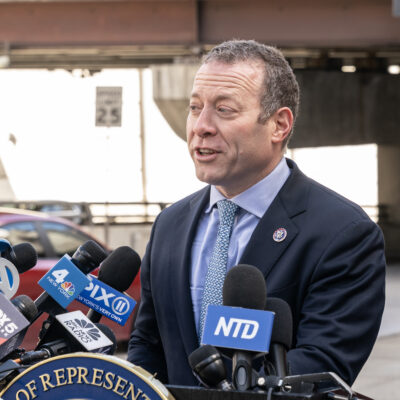USAID administrator indicates that U.S. aid recipients in Gaza continue to work with UNRWA
Power repeatedly described the scandal-plagued agency “indispensable,” suggesting that U.S.-backed humanitarian efforts will continue to collaborate with UNRWA even if the U.S. doesn’t fund it directly

Associated Press
USAID Administrator Samantha Power gestures during a press conference in Sarajevo, Bosnia, on Friday, Jan. 21, 2022.
U.S. Agency for International Development Administrator Samantha Power indicated in testimony on Capitol Hill on Wednesday that U.S.-backed humanitarian groups in Gaza will continue to cooperate with the United Nations Relief and Works Agency, despite Congress’ ban on funding to the U.N. body for at least the next year.
Power repeatedly described the scandal-plagued agency as “indispensable,” arguing there is no way to replace it in the short term and suggesting that U.S.-backed humanitarian efforts will continue to collaborate with UNRWA resources and personnel even if the U.S. doesn’t fund it directly. U.S. funding to UNRWA was frozen off in response to allegations that several of its employees participated in the Oct. 7 attack; lawmakers have long harbored a range of other concerns about the agency’s ties to Hamas and promotion of terrorism and antisemitism.
In her second consecutive day of testimony on Capitol Hill, appearing on Wednesday before the Senate Foreign Relations and House Foreign Affairs Committees, Power repeatedly said that, in Gaza, “there is no way to deliver food, to prevent further famine, without UNRWA at the heart of the response.”
“We are following the law, the Biden administration, [but] we think it’s really important for UNRWA to continue to do its vital work,” she said, expressing support for other countries stepping in to fund the agency, while urging them to use their influence to ensure reforms.
Power said that the U.S.’ humanitarian partners on the ground in Gaza “work through UNRWA because they have the distribution system,” explaining that U.S. partners “do rely on the humanitarian infrastructure and there is no ready substitute.”
Those U.S. partners include the World Food Programme, UNICEF and the International Medical Corps.
“Here and now, there is no substitute for the humanitarian backbone that they provide — just the sheer numbers of individuals, the experience they have, the knowledge of communities, where the trucks come from, who knows the routes,” she continued. “We should be supporting a humanitarian operation that has, as its backbone, UNRWA.”
Power, whose agency did not directly oversee U.S. support to UNRWA, said it’s “hard to imagine how humanitarian needs can be met, even if access improves at the scale it needs to improve” without the involvement of UNRWA employees and personnel.
She said other UNRWA donor countries have resumed their aid because they see the “indispensability” of UNRWA’s services, and that Israel has also decided to allow UNRWA to participate in aid convoys into northern Gaza because the efforts were not viable without UNRWA’s involvement.
UNRWA, Power said, has taken on a “quasi-state role” in providing education and healthcare in Gaza and elsewhere in the region that no other NGO or U.N. agency has the capability to replace, at least until a new governing structure is established in Gaza that can take on the responsibilities previously shouldered by UNRWA.
“There’s not an NGO or another humanitarian agency that can perform the function of a state, or at least I have not encountered one in my years of service,” she said.
She also highlighted UNRWA’s role elsewhere throughout the region, repeatedly highlighting that UNRWA educates millions of children in Jordan, a role she said the Jordanian government strongly supports and lacks the budget or resources to take on on its own.
Power further praised what she said are scores of UNRWA employees unconnected to terrorism working “selflessly” to address the humanitarian situation in Gaza. She did acknowledge the need for improved vetting, pointing toward a pending United Nations investigation for recommendations on that subject.
Power described the steps the Israeli government has announced, under pressure from the Biden administration, in recent days to expand humanitarian aid into Gaza, as positive but warned that there are “still really profound access issues” in bringing aid into Gaza.
Questioned about whether Israel was violating sections of arms sales law requiring recipients to comply with U.S. humanitarian efforts, Power said that there “have been significant restrictions that have impeded delivery” but declined to say whether those would constitute a violation of U.S. law, deferring to Secretary of State Tony Blinken.
Power added that the pre-war volume of 500 trucks into Gaza would not be sufficient to address the current humanitarian crisis, arguing the aid community is now playing “catch-up” to widespread deprivation and destruction on the ground.
She also assessed that there is a famine occurring in Gaza. In northern Gaza, she said the rate of malnutrition among children is now one in three, and those numbers are expected to further worsen.
Power reiterated comments from a day prior that the U.S. is not receiving reports from either humanitarian groups in Gaza or directly from the Israeli government that Hamas is stealing or directing the provision of food inside Gaza. She added that Hamas is “not the impediment” to the provision of food and other aid inside Gaza.
Given that “Hamas is on the run and being pursued across Gaza” it is not “in a position” to benefit from the aid that the U.S. is providing into Gaza, Power added.
Lawmakers questioned both of those assessments.










